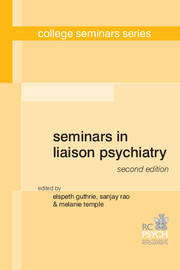Book contents
- Frontmatter
- Contents
- Abbreviations
- List of boxes, tables and figures
- List of contributors
- 1 Basic skills and competencies in liaison psychiatry
- 2 The liaison psychiatry curriculum
- 3 Classification and diagnosis
- 4 Capacity and consent
- 5 Psychological reaction to physical illness
- 6 Medically unexplained symptoms
- 7 Alcohol and substance use in the general hospital
- 8 Accident and emergency psychiatry and self-harm
- 9 Perinatal psychiatry
- 10 General medicine and its specialties
- 11 Liaison psychiatry and surgery
- 12 Neuropsychiatry for liaison psychiatrists
- 13 Psycho-oncology
- 14 Palliative care psychiatry
- 15 Sleep disorders
- 16 Weight- and eating-related issues in liaison psychiatry
- 17 Disaster management
- 18 Liaison psychiatry and older people
- 19 Paediatric liaison psychiatry
- 20 Primary care and management of long-term conditions
- 21 Occupational medicine
- 22 HIV and liaison psychiatry
- 23 Sexual dysfunction
- 24 Psychopharmacology in the medically ill
- 25 Psychological treatments in liaison psychiatry
- 26 Research, audit and rating scales
- 27 Service models
- 28 Developing liaison psychiatry services
- 29 Multiple choice questions and extended matching items
- Appendix 1 Specific competencies
- Appendix 2 Learning objectives with assessment guidance
- Index
11 - Liaison psychiatry and surgery
Published online by Cambridge University Press: 02 January 2018
- Frontmatter
- Contents
- Abbreviations
- List of boxes, tables and figures
- List of contributors
- 1 Basic skills and competencies in liaison psychiatry
- 2 The liaison psychiatry curriculum
- 3 Classification and diagnosis
- 4 Capacity and consent
- 5 Psychological reaction to physical illness
- 6 Medically unexplained symptoms
- 7 Alcohol and substance use in the general hospital
- 8 Accident and emergency psychiatry and self-harm
- 9 Perinatal psychiatry
- 10 General medicine and its specialties
- 11 Liaison psychiatry and surgery
- 12 Neuropsychiatry for liaison psychiatrists
- 13 Psycho-oncology
- 14 Palliative care psychiatry
- 15 Sleep disorders
- 16 Weight- and eating-related issues in liaison psychiatry
- 17 Disaster management
- 18 Liaison psychiatry and older people
- 19 Paediatric liaison psychiatry
- 20 Primary care and management of long-term conditions
- 21 Occupational medicine
- 22 HIV and liaison psychiatry
- 23 Sexual dysfunction
- 24 Psychopharmacology in the medically ill
- 25 Psychological treatments in liaison psychiatry
- 26 Research, audit and rating scales
- 27 Service models
- 28 Developing liaison psychiatry services
- 29 Multiple choice questions and extended matching items
- Appendix 1 Specific competencies
- Appendix 2 Learning objectives with assessment guidance
- Index
Summary
Day-to-day psychiatric liaison on surgical wards draws upon inherited pearls of wisdom, as there is a relatively small evidence base, few controlled trials and very little literature on surgical aspects of liaison psychiatry.
The Royal College of Psychiatrists and the Royal College of Surgeons collaborated to produce a joint report on the psychological care of surgical patients (Royal College of Surgeons ' Royal College of Psychiatrists, 1997). This document emphasises the importance of psychological problems in surgical patients and models of service, and makes recommendations for clinical practice, education and training, service provision, audit and research. One suspects, however, that few surgeons or liaison psychiatrists have read it. Unfortunately, in most standard surgical texts there is barely a mention of the patient's mental health or psychological issues that might be relevant to surgical care.
Prevalence of psychiatric illness
Clarke et al (1991) found that the prevalence of psychiatric illness was 23% on surgical wards compared with 45% on medical wards. Age and the presence of comorbid medical conditions independently predispose to psychiatric illness (Pasnau et al, 1996). Surgical patients experience the same kinds of disorders that are seen elsewhere in the general hospital and the community (Box 11.1). Surgeons, however, tend to refer to psychiatry less than physicians do. When they do, it tends to be when the patient does not consent to a procedure or is otherwise non-adherent or behaviourally disturbed.
When a decision is made as to whether to operate on a patient, a variety of clinical and ethical dilemmas can arise. When psychological and psychiatric issues are identified in the patient the liaison psychiatry multidisciplinary team should be best placed to communicate with the surgeon, surgical nurse and allied health professionals and to contribute to the patient's care.
Surgeons and psychiatrists
Surgeons are traditionally considered to be very different people compared with psychiatrists in terms of both personality and the culture in which they work. Over the past few years, surgeons have slowly but surely shaken off the Sir Lancelot Spratt stereotype (from the 1954 film Doctor in the House), while at the same time psychiatrists have slowly shaken off their stereotypes too. Although surgery is still predominantly a male specialty, the number of women consultant surgeons has doubled over 10 years and continues to grow (Royal College of Surgeons, 2011).
- Type
- Chapter
- Information
- Seminars in Liaison Psychiatry , pp. 151 - 165Publisher: Royal College of PsychiatristsPrint publication year: 2012



